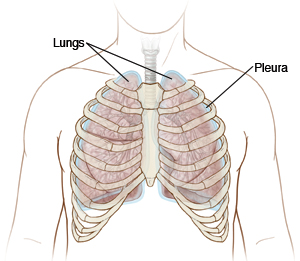The pleura is a smooth double membrane that surrounds the lungs. It separates the lungs from the chest wall. One side of the pleura attaches to the lung. The other side attaches to the chest wall. This membrane makes it easier for the chest to inflate and deflate as you breathe without rubbing against the ribs. You normally have a small amount of lubricating fluid (pleural fluid) between the pleural membranes.
A pleural effusion is when too much fluid collects in the space between the two pleural membranes (pleural space). As the amount of fluid increases, it begins to press on the lung. This makes it harder to take a full breath.
There are two types of pleural effusion:
-
Exudative. This is caused by extra fluid related to inflammation, injury, infection, or a tumor. Empyema is when pus builds up in the pleural space.
-
Transudative. This is caused by abnormal fluid pressures inside the blood vessels. The pressure can be caused by congestive heart failure (CHF). In CHF, extra fluid collects inside the lung tissues because of a weakened heart muscle. This extra fluid then leaks into the pleural space.
Pleural effusion may cause any of these symptoms:
-
Shortness of breath
-
Rapid breathing
-
Cough or hiccups
-
Sharp chest pain that hurts more with coughing or deep breathing
-
Fever
-
Fatigue
A small pleural effusion may cause no symptoms at all.
Treatment will be directed at the cause of the pleural effusion. If you are having a lot of trouble breathing, the healthcare provider may do a thoracentesis procedure to remove the fluid from the pleural space. This involves placing a needle or tube (catheter) through the chest wall into the pleural space. This usually gives relief right away. But the fluid may gradually return, depending on the cause. You may be given antibiotics if your pleural effusion was caused by an infection.
Home care
Follow these guidelines when caring for yourself at home:
-
Rest until you feel better. Exerting yourself may make your symptoms worse.
-
Your healthcare provider may have prescribed medicines to treat the underlying cause of the pleural effusion. Take these exactly as directed.
Follow-up care
Follow up with your healthcare provider, or as advised.
When to get medical advice
Call your healthcare provider right away if any of these occur:
-
Fever of 100.4ºF (38ºC) or higher, or as directed by your healthcare provider
-
Chills
-
Dry cough that doesn't get better with treatment
-
Generally not feeling well
-
Sudden inability to do daily activities
Call 911
Call
-
Shortness of breath gets worse
-
Chest pain gets worse
-
Chest tightness or heaviness
-
Coughing up blood
-
Weakness, dizziness, or fainting


